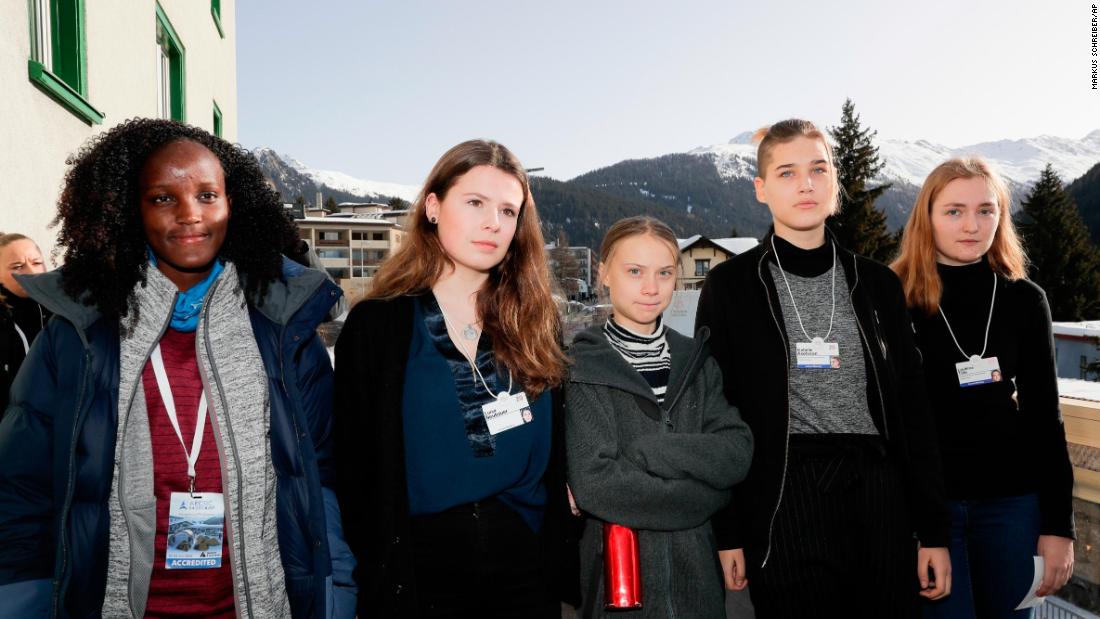Instead, she ended up at the center of a fierce debate over race and representation in the media.
Nakate told CNN that the incident points to a wider issue of erasure of African voices in climate action conversations.
“Africans have truly been erased from the map of climate action,” Nakate said during an interview at her home in Uganda.
“Very many African activists have been doing a lot of work, putting in a lot of effort, trying to get their message heard and listened to,” she added.
‘Sad and worthless’
She added in a video statement: “It was the first time in my life that I understood the definition of the word ‘racism.’ ”
Nakate says the experience left her feeling “sad and worthless,” because not only was she initially cropped out of the AP image, her presence was also not reported in initial versions of an article on the conference.
“My reaction was more of a feeling of sadness and a feeling of being worthless and having wasted my time at the press conference. Because I did not just see the photo, I went ahead to read the article. And, in the article still, I was not introduced as one of the activists who were at the press conference,” she says.
Her name appeared in later versions.
A movement ignored
Nakate was inundated with support on social media after the AP photo went viral. Thunberg condemned the agency’s action on her social media pages.
“The online reaction has been so powerful and very supportive. Despite all the hurt and the depression, I had very many people who came out and supported me,” she said.
“People have been pouring out all kinds of support, and speaking against any kind of discrimination or injustice towards African climate activists.”
Rather than erase her from the conversation, the crop instead has strengthened her voice and catapulted her to global recognition, with a newly verified Twitter account and thousands of new followers to her cause.
Nakate says what happened to her is not an isolated incident and is she will fight to ensure that African activists have a seat at the global table.
“Many of these [African] activists have been going through these things, but they just did not have the strength to air them out,” she said.
“Now is the time to put an end to it.”
Reactions echoed Nakate’s sentiment that the crop was symptomatic of a movement that largely has been ignored by Western mainstream media.
Africa most vulnerable to climate shocks
Nakate grew up in Kampala and got involved in activism in December 2018 after being bothered by unusually high temperatures in her country.
Drawing inspiration from Thunberg, she staged a solitary strike outside Uganda’s Parliament to protest climate inaction and rising temperatures that was met with interest by security forces, she said.
‘When I went to the Parliament, a couple of policemen checked my placard quite a number of times trying to look for a message or any kind of plot that I had against the government,” she said.
Experts say Africa is the most vulnerable to climate shocks, with more frequent droughts and floods stretching people to their limits as farmers and herders are left with little time to recover.
Over the weekend, Nakate returned from Davos to the home she shares with her parents and four siblings in Kitintale, a middle-class suburb of the country’s capital, Kampala.
She said she believes the cropping incident has kickstarted a conversation that will change the framing of African climate change activists.
“Everyone is speaking against the erasure of African activists and the world has set their eyes on these African activists. I believe that now is the time for them to be given the platforms to speak out and to be listened to.”
Correction: An earlier version of this story mis-attributed information to statements from the Associated Press. This has been corrected.
Silas Muwonge contributed to this report.
Source: CNN Africa


